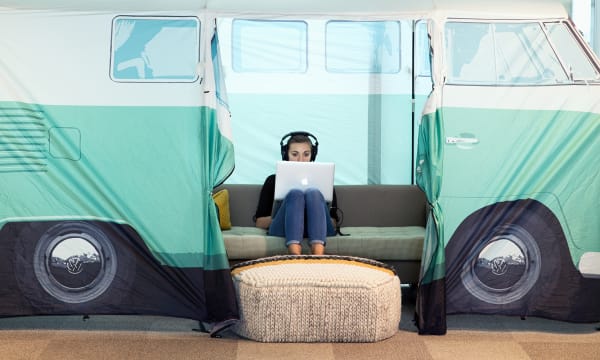A new work day centered in mental wellness is showing promise for worker capacity and creative output.
The pandemic forced companies and their employees to reformat where they could and should work each day. Now that flexible workplaces and hybrid office scheduling are more common, some companies are reconsidering when their employees might be most productive as well. As a result, a non-linear work day is emerging.
Oftentimes, workers may be inclined to force their way through a slow afternoon, but some experts believe taking a break is much better for their professional and mental capacity. The New York Times published an article in February about the importance of taking “brain breaks” throughout the day, featuring experts who unpacked the methods and benefits of doing so. Dr. Gloria Mark, professor of informatics at the University of California, Irvine said “We can’t expect to lift weights nonstop all day, and we can’t expect to use sustained focus and attention for extended periods of time, either.”
Taking a break can increase creative thinking in addition to productivity, according to some experts. Dr. Mark spoke to the Times about a study she participated in with Microsoft Research that found those who took a 20 minute walk outside returned to tasks with more “divergent attention,” or more creativity than their counterparts who skipped the physical break.
It’s Nice That, an insights platform designed by creatives, for creatives, published “The Lazy Report,” which explores the ways that “laziness,” or taking regular breaks and vacations, can actually boost worker creativity and productivity. 68% of creatives surveyed stated that they worked best when deciding their own work structure, and only 38% of respondents felt their best work was done in the office. Lucy Bourton, the report editor, stated that “Impossible timelines, budget constraints and client-focused work leave any possible creative spark extinguished.” The report’s conclusion suggests rest between tasks, prioritizing projects, and saying “no” when appropriate.
The PLoS One medical journal published a study in 2022 “on the efficacy of micro-breaks for increasing well-being and performance,” called “Give me a break!” The findings reported that even a small break had a positive impact on creativity and performance at certain tasks. “Break duration was revealed to be one of the significant results” the report states, “Indicating that the longer the break, the more micro-break leads to a performance increase.” The study also noted that what a person does during their break has an effect on the performance after the break: “When the tasks were creative, micro-breaks had a small, significant effect.”
At its core, the trend stems from employee’s continuous focus on better work-life balance. Recently, a TikTok work trend categorized by the hashtag #5to9routine, showcased millions of creators who choose to wake up at 5 am to secure a significant part of their day to selfcare, wellness, or their own exercise and daily tasks and rituals. The hashtag currently has over 12 million views, and presents another example of how popular work-life balance, by any means necessary, is with employees. Even parents can benefit from the flexibility: having a few hours in the morning or afternoon to be with children before and after school allows them to return to work for a few hours later that evening without missing out on family time.
“A rested mind will lead to our greatest work,” according to Bourton. The non-linear work agenda offers a solution to pressure for flexibility from employees and pressure from offices to maintain a steady work stream. Adjustable, intentional daily schedules that coordinate with one’s needs and rituals may lead to more productive, creative, and well-rounded employees than a strict, traditional 9 to 5.


